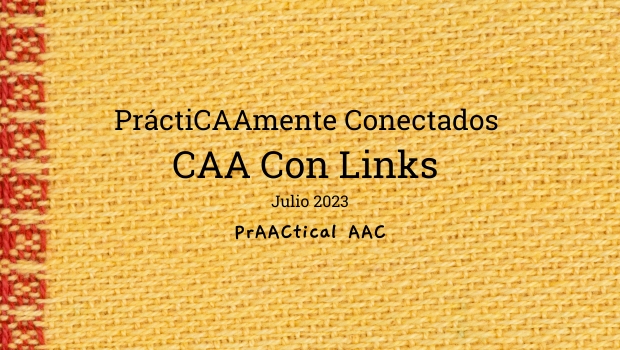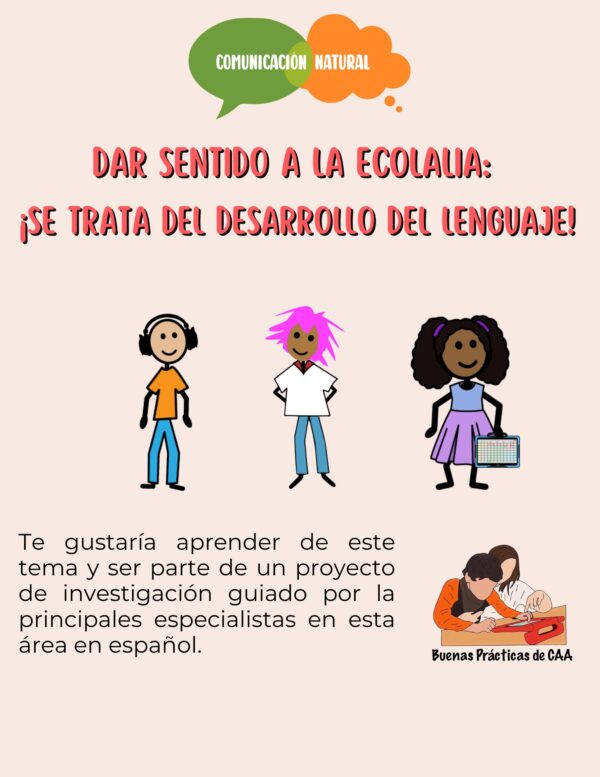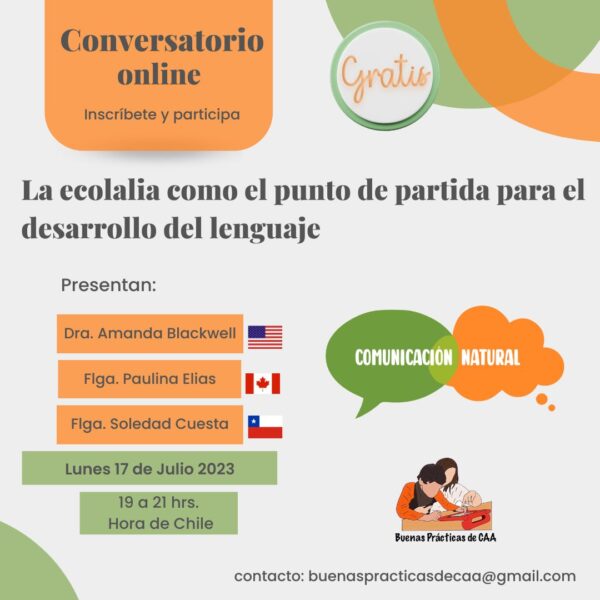PráctiCAAmente Conectados: CAA Con Links Julio 2023

Each month we feature a Spanish version of our AAC Link Up, CAA con Links. If you have AAC-related announcements, materials, or videos in Spanish that you would like others to know about, we’d love to have you add that information below. Also, please share this with anyone who might be interested in contributing to or using the materials that get added to these posts. You’ll find the place to add that information at the very bottom of this post.
Organized by Claudia Marimón, these monthly posts also feature AAC work being done in Spanish-speaking countries and offer translations of material that can help families and service providers. Today, she focuses on the topic of Natural Language Acquisition and gestalt language processing.
Enjoy the post, and remember to scroll to the bottom to add your link and see what others are sharing.
En el campo de la CAA siempre hay novedades, temas nuevos que investigar, este mes queremos compartir con la comunidad hispano hablante sobre un tema que está muy de actualidad y que ya está disponible en español “Adquisición Natural del Lenguaje (ANL)” a través de dos grandes profesionales fundadoras de Comunicación Natural, la Dra. Amanda Blackwell, EdD, SLPD, CCC-SLP y Paulina Elias, M.Cl.Sc., SLP Reg. CASLPO. Ellas forman parte del equipo de Marge Blanc, la autora de Natural Language Acquisition.
Quienes nos cuentan que “a lo largo de los años, las investigaciones científicas han demostrado que los niños pueden adquirir y utilizar el lenguaje de diferentes maneras. En el caso de muchas personas alrededor del mundo, y la mayoría de personas autistas, la ecolalia es una forma de comunicación válida. Dentro de la literatura, estas personas han sido llamadas procesadores gestálticos del lenguaje. Como fonoaudiólogos, muchos estamos acostumbrados a modelar palabras sueltas (por ejemplo: ‘carro’, ‘grande’, ‘bebé’) y/o hacer preguntas (por ejemplo: ‘¿Qué es eso?, ‘¿De qué color es el carro?’, ‘¿Dónde está la manzana? ‘) cuando interactuamos con cualquiera de nuestros niños. El problema es que estas estrategias no funcionan para todas las personas y, de hecho, la manera más eficaz de contribuir al desarrollo del lenguaje en estos casos es a través del juego y la Adquisición Natural del Lenguaje (Blanc, 2012)”.
Con el propósito de compartir sobre este tema invitamos a toda la comunidad hispano hablante a un Conversatorio Gratuito “La ecolalia como el punto de partida para el desarrollo del lenguaje” que se realizará el día Lunes 17 de Julio de 19:00 a 21:00 Hora de Chile (a hora de Chile tiene una zona horaria UTC -4) pueden inscribirse en este link: https://forms.gle/frrK4um79zRgJpQZA
Uno de los objetivos de este Conversatorio es aumentar el conocimiento sobre el apoyo que podemos brindar a los procesadores gestálticos del lenguaje (hablantes y no hablantes) para mejorar nuestros servicios terapéuticos. La información que compartiremos incluirá una introducción básica a la Adquisición Natural del Lenguaje (ANL), al igual que ideas de actividades que podemos utilizar para contribuir al desarrollo del lenguaje de nuestros niños. Finalmente, abordaremos el tema de la adaptación de sistemas alternativos y aumentativos de comunicación para los procesadores gestálticos del lenguaje y les invitaremos a participar en la recolección de muestras del lenguaje con fines de investigación.
Esperamos que todos puedan participar en esta emocionante oportunidad de aprender nuevas formas de conectarse con nuestros estudiantes.
In the field of AAC, there are always new topics to investigate further. This month we want to share with the Spanish-speaking community a subject that is very timely and already available in Spanish, “Natural Language Acquisition (NLA)” through two trailblazing professionals from Natural Communication, Dr. Amanda Blackwell, EdD, SLPD, CCC-SLP and Paulina Elias, M.Cl.Sc., SLP Reg. CASLPO. They are part of the core team of researchers of the author of Natural Language Acquisition, Marge Blanc.
They share with us that “over the years, scientific research has shown that children can acquire and use language in different ways. For many people around the world and most autistic people, echolalia is a valid form of communication. Within the literature, these people have been called gestalt language processors. As speech-language pathologists, many of us are used to modeling single words (for example: ‘car’, ‘baby’, ‘big’) and/or asking questions (for example: ‘What is that?, ‘What color is the car? ?’, ‘Where’s the apple? ‘) when we interact with any of our children. The problem is that these strategies do not work for everyone and, in fact, the most effective way to contribute to language development in these cases is through play and Natural Language Acquisition (Blanc, 2012).”
With the purpose of sharing this topic with you, we invite the entire Spanish-speaking community to a Free Conversation, “Echolalia as the starting point for language development,” that will take place on Monday, July 17, from 7:00 p.m. to 9:00 p.m. Chilean time (Chilean time has a UTC -4 time zone). You can register at this link: https://forms.gle/frrK4um79zRgJpQZA 
One of the objectives of this Conversation is to increase knowledge about the support we can provide to gestalt language processors (speaking and non-speaking) to improve our therapeutic services. The information we will share will include a basic introduction to Natural Language Acquisition (NLA), as well as ideas for activities that we can use to support our children’s language development. Finally, we will address the issue of the adaptation of alternative and augmentative communication systems for gestalt language processors, and we will invite everyone to participate in the collection of language samples for research purposes.
We hope that everyone can participate in this exciting opportunity to learn new ways to connect with our children.
::::::::::::::::::::::::::::::::::::::::::::::::::::::::::::::::::::::::::::
Los invitamos a participar en esta sección, compartiendo su propio contenido relacionado con CAA, novedades de productos, o cualquier otra cosa que estimen interesante para dar a conocer a los demás. Puede ser un post que han escrito recientemente, las diapositivas de alguna de sus presentaciones, algún apunte, video o meme que han publicado online, un producto que hayan creado, el anuncio de algún evento o conferencia relacionado con CAA, o cualquier otro contenido que hayan desarrollado y quieran compartir con la comunidad interesada en la CAA. Nuestra sugerencia es que publiquen una vez al mes.
Para enviar tu propuesta, desplázate hasta el final de esta publicación, y completa el formulario. Ingresa la URL y el nombre/título en los lugares disponibles. Si estás usando un dispositivo móvil, hagan click en la versión website para hacer esto.
La sección AAC Link Up tiene moderadores para evitar el spam, por lo que es probable que pase un tiempo hasta que tu propuesta esté visible.
Nota: Si estás usando un dispositivo móvil, haz click en la versión website para hacer esto. Si te interesa ver lo que está compartiendo la gente alrededor del mundo, chequea nuevamente al fin del día.
Filed under: AAC Link Up, Featured Posts
This post was written by Carole Zangari
